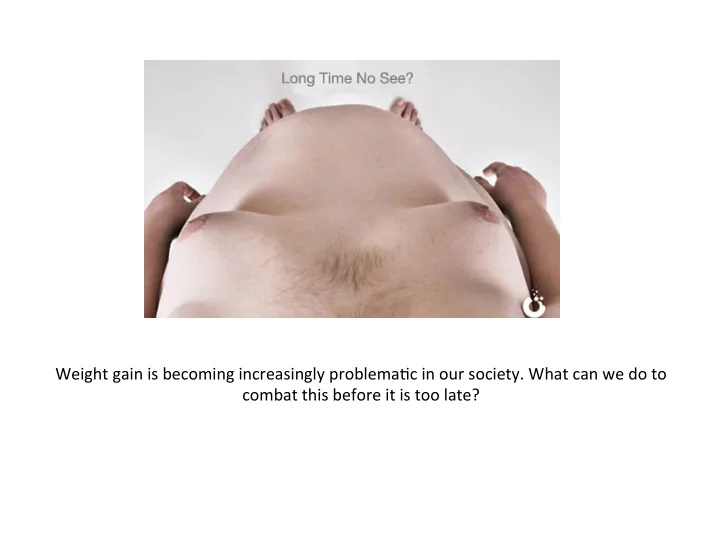

Weight$gain$is$becoming$increasingly$problema=c$in$our$society.$What$can$we$do$to$ combat$this$before$it$is$too$late?$
Conjugated$Linoleic$Acid$ CLA$or$conjugated$linoleic$acid$is$said$to$increase$fat$burning$in$muscles.$$ • Par=cular$cell$studies$have$also$demonstrated$CLA$to$block$the$‘fat$sensor’$PPARRgamma$ • which$helps$to$reduce$fat$accumula=on$and$improve$the$slimming$effect$that$people$desire.$$ $ When$combined$with$LRarginine,$which$is$a$fat$burning$amino$acid$scien=sts$have$found$that$ • rats$muscle$mass$increased$considerably$but$no$synergy$was$seen$between$the$two$ substances$when$it$came$to$fat$loss.$$ $ , , , , , , , , ,,,,,,,,,,,,,,,,,,,,,,,,,,,,,,,,,,,,,,,,,,,,,,,,,,,,,,,,,,,,,,,,,,,,,,,,,,,,,,,,,,,,,,,,,,,,,,,,,,,,,, , References: 'J'Nutr.'2009'May'13.'[Epub'ahead'of'print]. $ ,
BCAAs$ Study :$A$study$was$carried$out$on$twenty$five$compe==ve$wrestlers$who$restricted$their$daily$calorie$intake$to$ 28kcal/kg/d.$6$subjects$had$a$hypo$caloric$control$diet,$7$had$a$hypo$caloric$high$protein$diet,$6$had$a$hypo$ 75kg$ea=ng$2,100$calories$per$day$–$taking$0.3g/BCAA/kg$ caloric$branched$chain$amino$acid$diet$and$another$6$had$a$hypo$caloric$low$protein$diet.$ $ Those$who$had$the$branched$chain$amino$acid$diet$showed$the$most$significant$loss$in$abdominal$faAy$=ssue$ whilst$also$able$to$maintain$a$high$level$of$performance$in$exercise.$$ $ The$BCAA$diet$consisted$of$24.4kcal/kg/day$and$the$protein$supplement$contained$leucine,$isoleucine$and$ valine.$$ $ $ $ $ $
Studies$on$AlphaRlipoic$Acid$(ALA)$ Researchers$at$the$University$of$Ulsan$have$found$that$adding$ALA$to$the$diets$of$rats$will$consequen=ally$cause$a$weight$loss.$ Whether*this*is*the*case*for*in*humans*is*sJll*unknown.* ALA$is$not$a$vitamin,$but$is$made$in$=ny$quan==es$in$our$bodies.$The$ mitochondria$(the$powerhouses$of$our$cells)$use$this$energy$to$convert$nutrients$into$energy.$$ 1800mg$ALA$each$day$preserved$muscle$mass$on$VLCD$ $ A$study$was$carried$out$on$228$Koreans$with$a$BMI$of$30$or$more$(clinically$obese).$They$were$put$on$a$diet$of$600kcals$a$day$and$ divided$into$3$groups.$The$first$groupe$received$1200mg$ALA$a$day$alongside$their$diets,$the$second$group$received$1800mg$ALA$ alongside$their$diets$and$the$third$group$were$given$a$placebo.$$ This$study$took$place$over$the$course$of$20$weeks.$$ The$results$are$shown$below;$ $ The$studies$were$sta=s=cally$different$as$you$can$see.$The$group$that$lost$ the$most$weight$was$the$group$taking$the$1800mg$ALA/day$category.$ Usually$losing$weight$quickly$can$come$with$the$cost$of$losing$some$lean$ mass.$$ $ In$this$study$however,$only$a$small$amount$was$lost$in$comparison$to$fat.$ Some$side$effects$were$reported$by$the$Koreans$in$the$1800mg$category$ however,$but$researchers$remarked$that$side$effects$weren’t$enough$to$ eliminate$this$type$of$$supplement$for$weight$loss.$$ References:$ Am'J'Med.'2011'Jan;'124(1):'85.e1/8. $
Green$Tea$–$One$cup$burns$3g$fat$ Researchers$at$Lund$University$found$that$drinking$1$cup$of$green$tea$with$a$meal$may$boost$the$sa=a=ng$ effect,$reducing$hunger$and$the$need$to$eat$more.$This$may$then$help$to$induce$weight$loss.$Here$is$the$study;$ $ The$subjects$involved$in$the$study$ate$a$meal$consis=ng$of$white$bread$and$turkey$on$two$occasions.$On$the$ first$occasion$they$drank$a$cup$of$hot$water$with$their$meal,$and$on$the$second$a$300ml$cup$of$green$tea.$ Green$tea$increase$sa=ety$aaer$meals$ (Sencha$Tea).$The$tea$was$brewed$for$9$minutes$$resul=ng$in$80mg$caffeine,$26$mg$epicatechin$[EC],$90$mg$ epicatechin$gallate$[ECG]$and$32$mg$epigallocatechin$gallate$[EGCG].$The$green$tea$had$no$effect$on$the$ subjects$insulin$or$glucose$levels,$but$it$did$have$an$effect$on$their$sa=ety$following$the$meal.$They$felt$fuller$for$ longer$following$the$green$tea$drink.$$ $ Because$these$results$proved$significant,$it$might$be$of$importance$to$incorporate$this$study$into$one$on$obese$ subjects.$If$they$also$were$to$report$feeling$fuller$having$had$green$tea$alongside$meals,$this$might$be$an$ incen=ve$for$fat$loss.$$ $ $ $ $ Reference:, Nutr'J.'2010'Nov'30;9:63 . $
Burning$fat$ We$all$know$the$caffeine$can$help$with$fat$loss;$take$600$mg$per$day$and$you'll$burn$about$110$kcal$extra.$[Am$J$ Clin$Nutr.$1989$Jan;49(1):44R50.]$$ But$what$about$if$it$was$combined$with$Green$Tea?$ Researchers$at$the$University$of$Fribourg$placed$10$healthy$males$in$their$twen=es$in$a$respira=on$chamber$for$ 24$hours$to$measure$the$kcals$burned.$On$3$occasions$they$were$given$different$supplements.$On$the$first$they$ were$given$a$placebo,$on$the$second$they$were$given$50mg$caffeine$to$take$at$breakfast$lunch$and$dinner;$ whilst$on$another$occasion$they$took$150mg$caffeine$with$1.5g$green$tea$extract.$The$green$tea$had$ approximately$72%$of$EGCG$and$25%$catechines,$both$of$which$are$powerful$flavanoids.$$ The$following$table$shows$the$results;$ Caffeine$alone$boosted$calorie$ $ burning$by$15kcals$a$day,$whilst$ $ Thermogenesis$and$fat$oxida=on$increased$when$green$ green$tea$combined$with$caffeine$ $ boosted$kcal$expenditure$to$79.$ tea$extract$was$supplemented$in$addi=on$to$caffeine.$ Protein,$carbohydrate$and$fat$ $ levels$burned$were$also$tested.$ Thermogenesis$and$fat$oxida=on$ increased$when$green$tea$extract$ was$supplemented.$$ References:, Am'J'Clin'Nutr.'1999'Dec;'70(6):'1040/5 . , $
Green$Tea$stackers$don’t$work$without$exercise$ Green$Tea$supposedly$helps$us$to$burn$more$fat,$but$interes=ngly$it$doesn’t$increase$our$energy$expenditure.$ Researchers$at$a$Berlin$University$carried$out$a$study$on$10$overweight$men.$The$men$were$given$supplements$ for$3$days.$On$the$third$day$measurements$were$taken,$during$the$first$5$hours$of$measurements$the$subjects$ were$given$nothing$to$eat$or$drink.$Aaer$the$first$5$hours$they$were$given$a$meal$and$then$measured$for$the$ next$4$hours.$$ $ They$took$measurements$on$each$man$in$5$different$areas.$The$men$were$given$supplements$ranging$from$a$ placebo,$300mg$EGCG,$600mg$EGCG,$200mg$caffeine$and$a$supplement$containing$both$caffeine$(200mg)$and$ 300mg$EGCG.$They$took$these$supplements$over$the$next$few$days$in$2$goes$on$each$day.$On$the$third$day$ they$took$the$full$dosage$together,$1$hour$before$a$meal$washed$down$with$water.$The$supplements$did$not$ raise$the$energy$expenditure$of$the$men.$Here$is$a$figure$below$demonstra=ng$the$effects$of$the$supplement$ caffeine$AND$EGCG.$$ $ The$addi=on$of$supplements$meant$that$the$body$ changed$its$fuel$source,$largely$moving$from$CHO$to$ fat.$This$would$seem$desirable$to$most.$The$most$fat$ was$burned$in$the$male$group$that$consumed$the$ supplement$containing$caffeine$and$EGCG.$Changes$in$ energy$expenditure$would$only$occur$if$exercise$was$ also$carried$out.$$ Reference:, Eur'J'Clin'Nutr.'2010'Apr'7 $
Magnesium$Associated$with$Lower$Fat$Levels$ ‘You$are$likely$to$have$a$lower$fat$percentage$if$you$consume$more$magnesium$in$your$diet’$ researchers$claim.$$ Scien=sts$$at$the$FuRJen$Catholic$University$in$Taipei$took$24$hour$food$diaries$from$210$ overweight$par=cipants$$over$the$age$of$65$who$had$been$diagnosed$with$type$2$diabetes.$They$ also$carried$out$blood$tests$and$body$measurements$including$BMI$and$waist/hip$ra=o’s.$$ $ Results$showed$that$almost$90%$of$the$par=cipants$had$low$magnesium$(mg)$levels$with$40%$of$ these$having$ too*low*levels.* It$is$es=mated$by$scien=sts$that$we$should$consume$approximately$5$ mg/kg$a$day.$Those$in$the$study$with$4.5g$mg$in$their$diets$had$7cm$less/kg$bodyweight$than$ those$with$less$mg.$$ * The$researchers$took$the$food$diaries$from$the$par=cipants$and$split$them$into$two$groups;$the$ first$group$were$those$consuming$higher$levels$of$mg.$The$second$group$were$consuming$lower$ levels.$The$average$fat$mass$of$the$high$mg$group$was$24.5%.$For$the$lower$mg$group$the$ average$was$33.3%.$Just$coincidence?$
Similarly,$the$group$consuming$more$mg$also$showed$to$have$a$higher$HDL$ level$than$the$lower$group.$$ $ Higher$magnesium$levels$also$may$have$an$effect$on$depression.$$ $ $ Magnesium$may$have$a$beneficial$effect$on$body$fat$levels$and$may$improve$ metabolic$control$and$symptoms$of$depression.$$ Reference:'Nutr'J.'2012'Jun'13;'11:41 . $
Magnesium$and$Testosterone$ The$belief$that$magnesium$has$a$posi=ve$effect$on$anabolic$hormones$can$be$backed$by$a$number$of$studies.$$ In$an$Italian$study,$researchers$measured$the$magnesium,$IGFR1$and$testosterone$levels$within$elderly$male$ subjects.$ $ Results$were$sta=s=cally$significant$and$showed$that$those$with$lower$magnesium$levels$were$likely$to$have$ less$protec=on$from$free$radicals$within$their$cells,$crea=ng$inflamma=on.$The$more$inflamma=on$in$cells$is$ associated$with$cell$breakdown$and$less$anabolic$hormone$produc=on.$E.g.Rtestosterone.$$ $ More$studies$are$needed$to$conclude$that$magnesium$can$directly$influence$$anabolic$hormone$levels$ beneficially$$in$older$men.$Similarly,$studies$need$to$be$carried$out$on$other$people$of$different$life$stages$to$ conclude$a$need$for$increase$in$consump=on$of$magnesium$across$the$spectrum.$$ Reference: 'Int'J'Androl.'2011'Jun'15.'doi:'10.1111/j.1365/2605.2011.01193.x.'[Epub'ahead'of'print]. $$
Recommend
More recommend